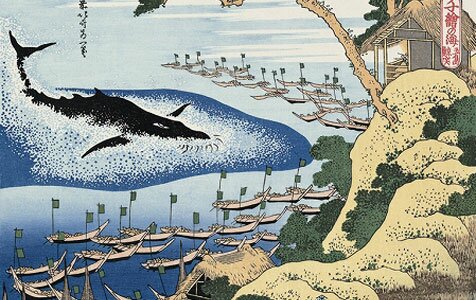Troubles in Paradise
From Microcosm Aquarium Explorer
Anti-Whaling Groups Call for Palau Boycott
By Louise Watson
A hallowed dive destination, Palau is an archipelago of 340 islands surrounded by dramatic reefs in the North Pacific Ocean—and a country that is frequently praised for its efforts to protect local reefs and waters.
Visitors to Cyber Diver’s web site, however, will notice a prominent call to boycott Palau on the grounds that it is “colluding with Japan to block establishment of whale sanctuaries and reverse the ban on commercial whaling,” a reference to the moratorium imposed by the International Whaling Commission (IWC) in 1985.
As it turns out, Palau is only one of numerous countries whose votes, it is widely believed, were “bought” by Japan, which has continued whaling in defiance of the global ban and has been trying for years to overturn the moratorium. (Japan's hunt is technically legal because of the IWC’s stipulation that some whales may be killed for scientific research, even though biologists the world over dispute the validity of doing so.) Norway and Iceland also carry on whaling, and in the past have formally rejected the ban; Iceland has recently suspended commercial whaling, at least for the immediate future, for lack of a domestic market for the meat, but continues a small "scientific" hunt.
Third World Bribery
Citing the argument that whales eat huge amounts of fish and threaten commercial fish stocks, the Japanese government has spent a staggering amount of money and time on efforts to induce small, often impoverished countries to join the IWC and vote against the ban at the organization’s meetings. (Many whales feed primarily on krill and copepods, and most scientists discount the claim that they are a significant threat to healthy fish populations.)
Japan not only often pays these nations' membership dues and costs of meeting attendance, but also has given them thousands of dollars in aid, mostly to develop or strengthen fisheries. Despite the fact that some of the countries are landlocked and many of them do not traditionally hunt whales, the connection between pro-whaling votes and aid is well documented and has been publicly admitted by officials of both Japan and many of the countries in question.
So far, however, Japan’s goal of putting together the three-fourths majority needed to overturn the international whaling ban has been unsuccessful. (The IWC's 60th annual meeting will be held in Santiago, Chile, in May. For a summary of the 2007 meeting, click here.)
Dying Traditions
It is not clear why Japan clings so doggedly to its right to kill whales. Since the 1960s, whale meat has not enjoyed much popularity in Japan or elsewhere, and whaling is a small part of the country’s economy. Although considered a delicacy by older Japanese, a significant portion of the country's whale meat harvest goes uneaten for lack of consumer demand. Proponents argue that eating whale has ancient roots in Japan, and they are encouraging consumption among younger generations and school children.
Many Japanese people now oppose the whale hunt, but in November 2007 the Japanese fleet set out on a hunt even more ambitious than those it has previously conducted, with a stated goal of taking 50 humpback whales, 50 fin whales, and 935 minke whales. Harassment by environmental groups like Greenpeace and the Sea Shepherd Conservation Society has, in part, thwarted their efforts.
In addition to Palau, a number of countries in Africa, South and Central America, the Eastern Caribbean, and the South Pacific have yielded to the economic temptation offered by Japan and dutifully voted to block whale sanctuaries, resume commercial whaling, and otherwise minimize scrutiny and regulation of the industry. Some of the countries that have been, and in most cases continue to be on that list: Antigua and Barbuda, Congo, Dominica, Ecuador, Egypt, Gabon, Grenada, Kiribati, Laos, Malawi, Micronesia, Nauru, Nicaragua, Palau, Panama, Papua New Guinea, St. Kitts and Nevis, St. Lucia, St. Vincent and the Grenadines, Seychelles, Solomons, Suriname, Tuvalu, and Vanuatu.
For many of them, a pro-whaling stance appears to be at odds with a burgeoning source of income: whale watching and eco-tourism. By casting Palau in a negative light, the anti-whaling movement, led by Australia and New Zealand, hopes to send a message to other countries with tourism industries to protect. And a meeting of IWC delegations in London this March brought a glimmer of hope: pro-whaling and anti-whaling factions agreed to try to reach concensus in the future.
Links
A very detailed and well-documented paper on this subject, written by the Third Millennium Foundation, can be found on the blog of Brian Fitzgerald, long-time employee of Greenpeace.
Other resources:
World Wildlife Fund Whaling Facts & Figures
Credits Middle (whale meat): (Wikimedia Commons/Chris73/GNU); bottom (Sea Shepherd): Sea Shepherd Conservation Society
Louise Watson is an Aquarium Explorer associate editor.









